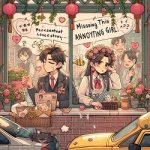Love And Marriage Narrative
Before she met him, she was like a rose wet by a fine drizzle on the eaves: beautiful, noble, admired but unreachable. Many pursued her, all seemingly better than him, but she chose none. She was willful and proud, firmly believing in the principle of “better to go without than settle for less.”
She met him at a friend’s wedding. For her, the wedding was an ironic slap in the face: the groom had once liked her, but she, surrounded by admirers, had disdainfully ignored him. Eventually, he was taken by the bride, though it wasn’t exactly being taken, as she had willingly let him go.
Now, seeing the happy couple, she felt a pang of bitterness. To save face, she attended briefly and left early, unable to bear the sight. He was a colleague of the groom, also leaving early to attend a meeting. They walked together and naturally started talking. The spring grass was as green as jade, washed by the previous night’s moonlight, glistening and charming. When it started to rain, they took shelter under an eave and continued their conversation. She found herself enjoying the atmosphere, smiling more as she looked at him.
From that day on, she never wore high heels again because he was short. He was a fair-skinned young man with neatly cropped hair, clear eyes, and a boyish charm. He often walked with a leisurely swagger and had a mischievous smile. He always blinked suddenly while talking, which he attributed to his nearsightedness and the habit of wearing contact lenses. He was not particularly outstanding, but he was the only one she could find now. She hoped he would pursue her. When he did, she felt a reassuring excitement; when he didn’t, she felt inexplicably melancholy.
After graduating from college, she stayed in the city, working as a high school teacher. Compared to the complexities of society, dealing with simple-minded students made her seem out of touch with reality, and naturally, she felt lonely. In her deep, well-like loneliness, she was like a beautiful frog, limited by the sky’s expanse and the number of people she knew. She could only admire herself in the mirror.
The slow days passed by like silk unraveling, her youth slipping away quickly. Being a sensitive woman, each day felt like three years, each passing day alarming her. She had a pristine view of love, much like Liu Xianglian, seeking perfect love but always encountering flawed suitors. She wanted to wait for the right one, but beautiful women cannot withstand the erosion of time. Dying at the peak of beauty might be a blessing, but no legend befell her.
As 30 approached rapidly, she felt the urgent need to find a conventional marriage to escape, or she would be half-dead in this world. She couldn’t bear the concerned looks from older colleagues or the surprise from former classmates.
He seemed to be the one, even though their life views were vastly different. He liked money and all worldly pleasures, his ambitions paved by wealth. His life goal was to earn enough money to live a luxurious, kingly life in a land of gentleness and wealth, with endless drinks and blooming flowers.
She felt his industrious life was painful, sympathized with him, but couldn’t forgive him. To him, marriage was a utilitarian strategy. He initially wanted a girl with a better background, as starting from scratch was not worthwhile.
However, having met her, he didn’t want to start over. He knew the trouble of chasing girls and preferred to build a life with her rather than someone climbing the ladder of success.
They met three times a week: Wednesday, Friday, and Saturday. On Wednesday afternoons, she had political studies, and students were off, so she had no evening classes. He would visit her, and they would watch a movie or take a walk. Her family wasn’t in the city, and she lived in a communal dorm, so he would take her to his house for better meals. He had an older and a younger brother, neither married. She noticed the brothers’ envy towards him because of her. Despite her beauty, she was like a rare gem, making him seem like a hero among ordinary men.
His parents were nice to her, balancing between genuine affection and a desire to win her over. His mother knitted sweaters for her, and his father occasionally praised her intelligence. The family treated her like a treasured guest. She had never faced life’s harshness, so she didn’t know or care to know what it was like.
One noon, he called, asking urgently, “How about getting married? My unit is allocating new apartments. We could have a place to live. Let’s get married.” She listened to his fragmented voice over the poor connection, looking at the garden in full bloom, white lilacs like ice flakes, exuding a chilly fragrance. She remembered clearly how he made her laugh that rainy day a year ago, how he pleased her with his words. They both knew what would happen next—he would pursue her, likely the last to do so.
The principle of “better to go without than settle for less” had fallen to “better than nothing,” filled with sighs of resignation. Proposing marriage is a man’s highest compliment to a woman, but his proposal sounded like haggling. She lazily and somewhat contentedly agreed, “Alright.” After hanging up, she realized she forgot to ask if he loved her. It didn’t matter; asking wouldn’t guarantee a truthful answer. They busied themselves preparing for the wedding, taking bridal photos, buying furniture, and filling their new apartment with clutter.
Sometimes, she watched him, dressed in old clothes, likely his school uniform, looking exceptionally spirited. He seemed like an innocent boy, busy with chores. Occasionally, he would ask for a nail, making her feel disoriented, as if the whole world was pressing in.
The wedding proceeded as planned, a blend of Western and traditional styles. She wore a white wedding dress, and amidst the fireworks and festive noise, they exchanged vows. After a tiring day, someone gifted them a pair of delicate crackled porcelain vases, rich in meaning.
Such vases, standing perfectly on a table, symbolize a perfect marriage, but if dropped, the shards represent love. Their marriage, like the crackled vase, was neither perfect nor tragic, merely a mutual exploitation.
The crackled vase stood there, fragile yet complete, always on the brink of collapse. Three years passed.
Naturally, they divorced, becoming an ordinary pair among countless others. She moved back to the school’s single dormitory. Sometimes she thought if she hadn’t married him, she would still be living in the same pristine room. But marriage and divorce were different; now, she was a common divorced woman, not a conspicuous older single woman.
This marriage and divorce gave her life a protective layer, allowing her to accommodate lower standards in future relationships without much awkwardness. He went into business, fulfilling his lifelong dream of commerce. Without her, he had fewer worries, gambling everything without a fearful woman beside him. Whether she was there or not, he would have followed his plans, but her presence provided an excuse for his earlier failures.
They never had childish quarrels, nor much struggle, growing distant day by day. Many say that after divorce, friendship remains, but that’s rarely true. Once married, they had seen each other in pajamas, knew each other’s quirks. Distance creates beauty, beauty creates illusions, but once the truth of distance is known, friendship loses its charm. They met once on a bus, standing at opposite ends.
As the bus passed a construction site, a banner read, “Quality First, A Hundred-Year Plan.” The bus fell into a peculiar silence. She thought of their marriage; he thought of the same. Their crackled vase of a story fell short of that single sentence.
Thank you for reading! ” Sitestorys “


